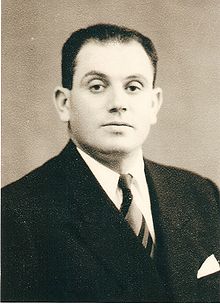Hussein Maziq
| Hussein Maziq حسين يوسف مازق |
|
|---|---|
 |
|
| Prime Minister of Libya | |
|
In office 18 March 1965 – 2 July 1967 |
|
| Preceded by | Mahmud al-Muntasir |
| Succeeded by | Abdul Qadir al-Badri |
| Foreign Minister of Libya | |
|
In office 22 January 1964 – 18 March 1965 |
|
| Prime Minister | Mahmud al-Muntasir |
| Preceded by | Mohieddin Fikini |
| Succeeded by | Wahbi al-Bouri |
| Governor of Cyrenaica | |
|
In office May 1952 – October 1961 |
|
| Preceded by | Muhammad Sakizli |
| Succeeded by | Mahmud Buhedma |
| Personal details | |
| Born | 1918 Tacnis, Libya |
| Died | 12 May 2006 (aged 87–88) Benghazi, Libya |
Hussein Yousef Maziq (Arabic: حسين يوسف مازق) a Libyan politician (1918 – 12 May 2006) was Prime Minister of Libya from 20 March 1965 to 2 July 1967. He was one of the most important men in the Kingdom era of Libya.
Maziq was a descendant of the Haddouth family of the Barasa tribe living in Cyrenaica, Libya. Haddouth, from whom the family bears its name, had been in 1822 already in charge of leading the Barasa. Instantly, his son Abubakr, assumed the leadership of Barasa, In 1844, the Ottoman Empire appointed him a Bey over all the Harabi tribes (including Barasa and Ubaidat). He had involved in 1860 in The Barasa-Ubaidat War, but he had not survived to see its end. He moved to Benghazi and died there in 1870. His son Maziq inherited the leadership and managing the conflict until the combatants agreed to make peace in 1890.
Maziq (Hussein's grandfather) remained as the leader of Barasa until his death in 1909. He'd left four sons: El Mabrouk (his political heir), Yousef (Hussein's father), Bushdeig, and Uroug, a folk-poet.
As the Italians invaded Libya in 1911, El Mabrouk led the Barasa against them, as the leaders of other tribes did. He was killed at the battle of "Ain Bumansur" near Derna in 1912. Since he had born no children, Yousef became the Barasa's leader.
Hussein Yousef Maziq was born in 1918 near Tacnis (120 km east of Benghazi). Because of Yousef's connection to the resistance leaders, Libya's Italian government arrested and expatriated him along with his wife, Mardiya, and the newly born Hussein to Cyrene, where Yousef stayed until his death in 1934.
A long time before his death, Yousef has lost his sight, so the Barasa's leadership was transferred to his brother Bushdeig. In 1929, Bushdeig attended the Sidi Rhuma talks between the resistance leaders, headed by Omar Mukhtar, and Libya's Italian government, headed by Pietro Badoglio. Hussein, at 11, also was there, and, as he told more than once, met Mukhtar who knows his Parents.
...
Wikipedia
